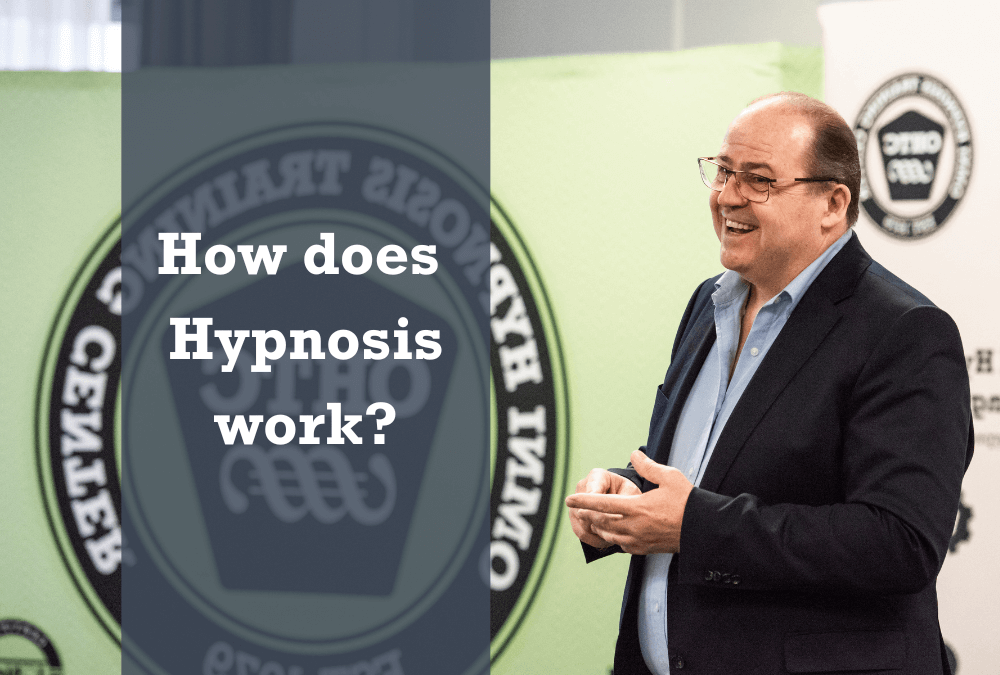Maybe you have heard or read about hypnosis. Perhaps you are interested in hypnosis in a private or professional context, and you want to know how hypnosis works.
In this article, we will explore how hypnosis works and what it can be used for.
To go along with the article, you can find an explanatory video of me on YouTube. I am Hansruedi Wipf, owner and president of OMNI Hypnosis and author of “Hypnosis, Health, and Healing the Natural Way,” published by Giger Verlag.
Support of people with hypnosis – how does it work?
It is no secret that hypnosis is one of the most popular and effective tools in a therapist’s toolbox. The fact that we have trained more than 16,000 people in the OMNI method over the past few years supports that statement. Our trainees now use it successfully in their offices, clinics, coaching, sports, and top-level sports.
Hypnosis, I know, works. But how? First and foremost, it is important to understand that we all experience the natural state of hypnosis every day – but unconsciously. In OMNI hypnosis training, we use Gerald F. Kein’s Mind Model to explain what happens in hypnosis. Right from the start: It is far less spooky than you might think.
Because it’s actually quite simple: hypnosis is the state that bypasses the critical factor of consciousness, establishing selective and acceptable thinking and feeling.
Explained more simply, it means that consciousness takes a back seat. With all its limitations, susceptibility to error, and its own logic, which is not the same logic as the logic of the subconscious mind. In this way, the subconscious can come to the forefront, and direct communication with it becomes possible.
The critical factor also described as a bouncer or firewall, withdraws and observes what is happening passively and from the sidelines.
Now it is possible to get to the core, the cause, or root of a problem – and to do so without being disturbed by the rational part of the conscious mind. A good hypnotist, hypnosis coach, or hypnotherapist is now guided by the subconscious mind to the cause during the hypnosis session and can neutralize it with specific techniques.
This is how hypnosis works, and it helps countless people around the world to work causally and solve problems at their roots.
Who can use hypnosis – and when?
People often ask: “Who can use hypnosis? And when is it useful to work with hypnosis?” Quite simply, almost anyone can learn hypnosis – and there are countless ways to use hypnosis methods.
Obviously, it is important that a hypnotist, hypnosis coach, or hypnotherapist is well and thoroughly trained. The OMNI training, for example, is ISO 9001 certified, follows the same structure worldwide, and provides consistent quality and high-quality documentation for graduates.
The participants of our online training or our face-to-face courses receive practical knowledge, learn the basics of the connections between subconsciousness and consciousness, and are able to work with people. We greatly value those factors.
Our courses are attended by doctors, therapists of all kinds, alternative practitioners, members of the medical and nursing professions, as well as business managers, and people interested in alternative methods of treatment.
A significant component of the training is the same for all: A hypnotist, hypnosis coach, or hypnosis therapist does not replace a doctor! He is not responsible for making a diagnosis or prescribing medication.
He is not a miracle healer or a substitute for medication, vaccines, or traditional therapies. However, it is possible, even useful, to involve a well-trained hypnotherapist as a supplement to classical forms of the state-recognized healing professions.
The range for the use of hypnosis is wide:
OMNI hypnotherapists use hypnosis for a variety of ailments and challenges. They apply hypnosis in their practices, clinics, and with their clients as a tool for:
Insomnia and sleep problems
Fatigue and exhaustion
Depressive moods
(Sports) injuries
Fibromyalgia
Emotion control
Lack of motivation
Test anxiety
Fears and phobias
Allergies
Addictions
…
This list is almost infinite to continue – it represents a part of the symptoms that the clients of our graduates have been able to relieve using hypnosis.
If you are interested in the successes already achieved with OMNI hypnosis, take a look at our YouTube channel. There you will find many examples.
So let’s summarize:
It is conceivable, even useful, to train in hypnosis as a medical professional or therapist, in leadership, or as a sports coach. Hypnosis can be applied in many areas. In hypnosis, our concern is to find the cause and neutralize it.
Complementary to our article on how hypnosis works:
If you are a professional and want to delve deeper into the subject, perhaps even consider using hypnosis in your practice, then use the free access to the OMNI Hypnosis Academy. There you will find the first six lessons of the hypnotist training without cost or purchase obligation.
I explain the most important terms of the hypnosis vocabulary and describe exactly which words are inappropriate and to be avoided in the context of hypnosis. Furthermore, you will learn about Gerald F. Kein’s “Mind Model,” which impressively demonstrates how hypnosis and the human mind work.
Now that you understand how hypnosis works, who can use the method, and when it makes sense to work with it, the only question that remains is when you will start using it yourself.

